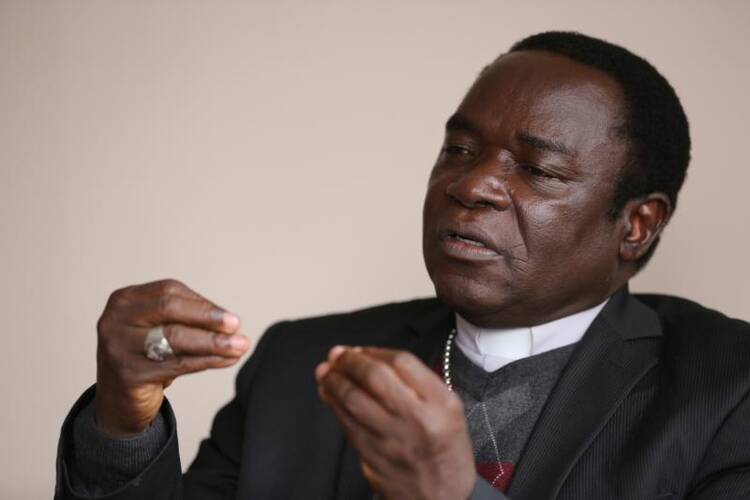KAKAU, Nigeria (CNS) -- Describing a seminarian who was kidnapped and killed by terrorists as a martyr, a Nigerian bishop urged worshippers at the young man's funeral to uphold their faith and demand that the country's president protect people of all faiths in violence-prone areas of the country.
"It is time to confront and dispel the clouds of evil that hover over us," Bishop Matthew Hassan Kukah of Sokoto said during his homily Feb. 11 at the funeral Mass for the seminarian, Michael Nnadi.
Nnadi, 18, was kidnapped with three other seminarians and the wife of a doctor Jan. 8 during an attack at the Good Shepherd Seminary in Kakau, in Nigeria's Kaduna state.
Nnadi and the doctor's wife were arbitrarily separated from the group and killed. The other seminarians eventually were freed in late January.
The seminarian's death is the latest in a string of attacks against Christians in Nigeria, who have been targeted by terrorist groups such as Boko Haram, but also by bandits seeking to extort money from the Catholic Church.
Bishop Kukah said President Muhammadu Buhari must respond to his campaign promise prior to the 2015 election to rout terrorist organizations that have targeted Christian communities and small towns with violence, kidnappings and killings.
"The president has displayed the greatest degree of insensitivity in managing the country's rich diversity," Bishop Kukah said, charging that Buhari has allowed one group of people to dominate others throughout Nigeria.
"The impression created now is that, to hold a key and strategic position in Nigeria today, it is more important to be a northern Muslim than a Nigerian," Bishop Kukah told those gathered for the Mass.
He said it was time for the Buhari government to address growing poverty in northern territories that has led to the rise in terrorist organizations. The bishop also cited growing concerns among Muslim elders that the region's challenges are being ignored by the government.
"The time has come for Christians to have a stronger, broader voice in government so that the challenges of poverty and violence can be overcome," Bishop Kukah said.
"Nation building cannot happen without adequate representation and a deliberate effort at creating for all members a sense, a feeling, of belonging, and freedom to make contribution. This is the window that the killers of Boko Haram have exploited and turned into a door to death. It is why killing Christians and destroying Christianity is seen as one of their key missions," he said.
The bishop called on Christians to "rise up and defend their faith with all the moral weapons they have."
"We must become more robust in presenting the values of Christianity, especially our message of love and nonviolence, to a violent society. Among the wolves of the world, we must become politically alert, wise as the serpent and humble as the dove," he said.
While Christians may feel angry, sad and tempted to carry out vengeance in the face of death, nonviolence is the appropriate response to violence, Bishop Kukah added. "It is the road less traveled, but it is the only way."










